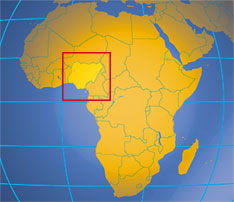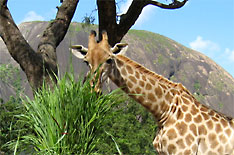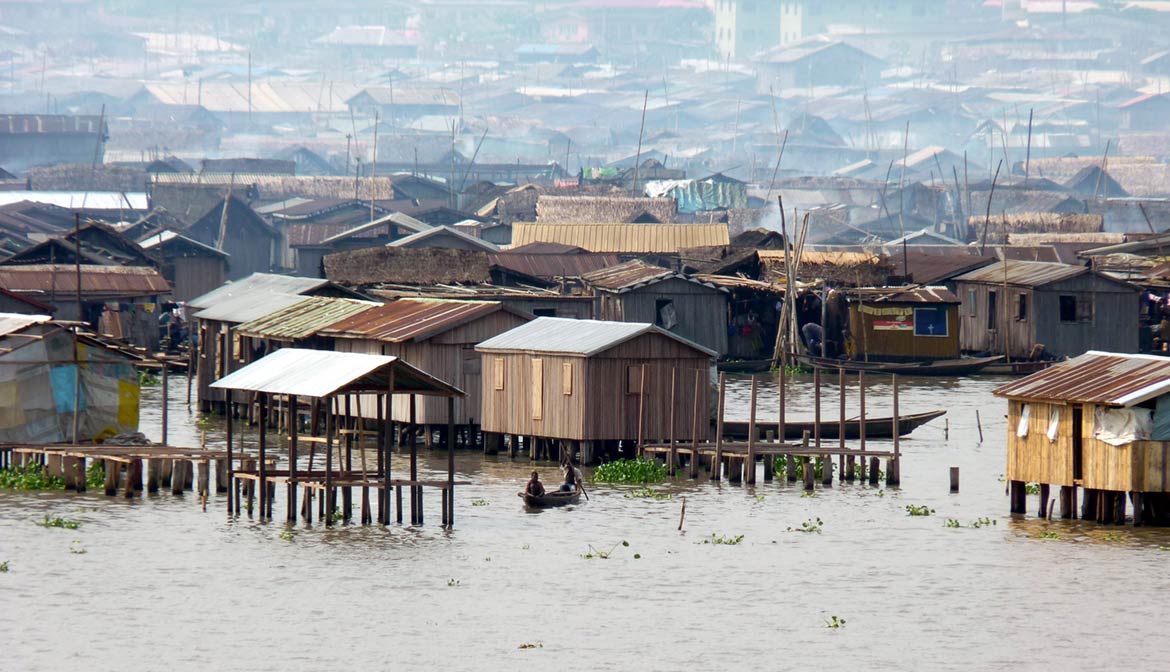| Home |
|
___ Nigeria |
|
 Zuma Rock, the huge monolith in Niger State north of Nigeria’s capital Abuja. Image: Jeff Attaway |
|
| A virtual guide to Nigeria, a country on the coast of West Africa, bordered by the Bight of Benin and the Gulf of Guinea in south. Nigeria is bordered by Benin, Cameroon, Chad, and Niger, it shares maritime borders with Equatorial Guinea, Ghana, and São Tomé and Príncipe.
With an area of 923,768 km² the country is almost four times the size of the UK or slightly more than twice the size of the U.S. state California. Nigeria’s main rivers are the Niger, where it got its name from, and the Benue, the main tributary of the Niger. The country’s highest point is Chappal Waddi (or Gangirwal) with 2,419 m (7,936 ft.), located in the Adamawa mountains in the Gashaka-Gumti National Park, Taraba State, on the border with Cameroon. The Federal Republic of Nigeria (its official name) has a population of of 177.5 million people (UN est. 2014) making it Africa’s most populous country. Capital city is Abuja located in the center of the nation, while Lagos is the primary port, economic hub and the largest city. |
 |
Federal Republic of Nigeria |
Country Profile |
 Flag of Nigeria |
Official Name: Federal Republic of Nigeria conventional short form: NigeriaISO Country Code: ng Actual Time: Fri-Dec-16 11:58 Local Time = UTC +1hCountry Calling Code: +234Capital City: Abuja (pop. 1 million). Other Cities: Government: Administrative Divisions: Geography: Climate: Temperatures 22-36°C, annual rainfall ranges from 381 cm. along the coast to 64 cm. or less in the far north. People: Natural resources: Petroleum, natural gas, tin, columbite, iron ore, coal, limestone, lead, zinc. Industries: Crude oil, coal, tin, columbite, palm oil, peanuts, cotton, rubber, wood, hides and skins, textiles, cement and other construction materials, food products, footwear, chemicals, fertilizer, printing, ceramics, steel. Exports – commodities: petroleum and petroleum products 95%, cocoa, rubber Exports partners: US 16.8%, India 11.5%, Netherlands 8.6%, Spain 7.8%, Brazil 7.6%, UK 5.1%, Germany 4.9%, Japan 4.1%, France 4.1% (2012) Imports – commodities: machinery, chemicals, transport equipment, manufactured goods, food and live animals Imports partners: China 18.3%, US 10.1%, India 5.5% (2012) Currency: Naira (NGN) |
| Background: British influence and control over what would become Nigeria and today Africa’s most populous country grew through the 19th century. A series of constitutions after World War II granted Nigeria greater autonomy; independence came in 1960. Most of the next 40 years Nigeria was ruled by two military juntas (1966–79 and 1983–98). Only in 1999 a new constitution was adopted, and a peaceful transition to civilian government was completed. The government continues to face the daunting task of reforming a petroleum-based economy, whose revenues have been squandered through corruption and mismanagement, and institutionalizing democracy. In addition,Nigeria continues to experience long-standing ethnic and religious tensions. Although both the 2003 and 2007 presidential elections were marred by significant irregularities and violence, Nigeria is currently experiencing its longest period of civilian rule since independence. The general elections of April 2007 marked the first civilian-to-civilian transfer of power in the country’s history and the elections of 2011 were generally regarded as credible. In January 2014, Nigeria assumed a nonpermanent seat on the UN Security Council for the 2014-15 term. |
|
Note: External links will open in a new browser window.
Official Sites of NigeriaState House – Office of the President Welcome to Nigeria Diplomatic Missions Maps
|
Nigeria NewsThe Guardian Daily Independent Daily Trust Leadership This Day The Punch Vanguard |
Bookmark/share this page |
Arts & CultureAdire African Textiles Ethnic groups of Nigeria |
Business & EconomyNigeria has emerged as Africa’s largest economy, with 2013 GDP estimated at US$ 502 billion. Oil has been a dominant source of government revenues since the 1970s. Regulatory constraints and security risks have limited new investment in oil and natural gas, and Nigeria’s oil production contracted in 2012 and 2013. Nevertheless, the Nigerian economy has continued to grow at a rapid 6-8% per annum, driven by growth in agriculture, telecommunications, and services. Transport |
Destination Nigeria – Travel and Tour GuidesNigeria Tourism Official Home Page World Heritage Sites in Nigeria Osun-Osogbo Sacred Grove Sukur Cultural Landscape SOURCE: The Nation |
Travel and Tour Consumer Information
|
 Wild-Life Nigeria © Nigeria Tourism |
|



